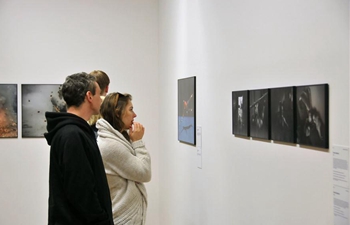
German Chancellor and leader of German Christian Democratic Union (CDU) Angela Merkel (C) shakes hands with leader of German Social Democratic Party (SPD) Martin Schulz (R) after a joint press conference at the headquarters of SPD, in Berlin, Germany, on Jan. 12, 2018. (Xinhua/Shan Yuqi)
BERLIN, Jan. 17 (Xinhua) -- German Chancellor Angela Merkel (CDU) on Wednesday ruled out further political concessions in the preliminary coalition agreement between the Christian Democratic Union (CDU), Christian Social Union (CSU) and German Social Democrats (SPD).
"The cornerstones of this policy paper cannot be renegotiated," Merkel told the press here. At most, it was possible to "finalize" some of its legislative points, she added.
The chancellor's public intervention came in response to heated debate within the SPD over whether to proceed with the formation of a new "grand coalition" and related calls for changes to joint proposals formulated by the parties involved so far.
While both CDU and CSU leadership has recommended moving to the last stage of negotiations in the formation of a new German government, SPD leader Martin Schulz must still obtain approval from his party base to join what would become Merkel's fourth ruling cabinet at a specially-convened conference on Sunday.
SPD's youth organization in particular has voiced its opposition and warned that another five years as junior partner in a government with the CDU and CSU would further diminish the party's future electoral fortunes.
Speaking to public broadcaster SWR, Johanna Uekermann, member of the SPD leadership committee, expressed skepticism towards joining a "grand coalition" and argued that the CDU/CSU should have offered more concessions.
Several other senior party figures, including SPD vice president Ralf Stegner joined Uekermann in demanding re-negotiations. However, Merkel echoed earlier responses from CDU and CSU politicians on Wednesday by rebuffing such calls.
The CDU leader emphasized that the two conservative sister parties had already made "heavy concessions" during the talks which culminated in the preliminary agreement. Merkel said that a good foundation for a new government had been established in previous negotiations and expressed her hope that the SPD would hence arrive at a "responsible decision" at its upcoming party conference.
Falling short of meaningful changes to the existing 61-page document, German media drew attention to the inclusion of a formal re-assessment of the work and validity of the "grand coalition" after two years in office as potentially allying concerns within the SPD.
Describing the process as a "mid-term evaluation", Schulz told media Redaktionsnetzwerk Deutschland that the SPD would hereby obtain the chance to communicate the legislative results which it was happy with, as well as necessary improvements.
Negotiators for the CDU, CSU and SPD have agreed to a "stock-taking" exercise halfway through the new government's term. The clause has been seen as reflecting the relatively low levels of support commanded by a new "grand coalition" among the German electorate (53.5 percent).
Nevertheless, it remains unclear whether the SPD would actually exit office again in the event that it should take an unfavorable view of progress after two years.
In the near-term, Schulz has continued to tour throughout Germany in attempt to drum up support among his fellow party members for joining another Merkel cabinet. He has received prominent support from SPD parliamentary faction leader Andrea Nahles, leading trade unionists and several SPD mayors.
Aydan Oezoguz (SPD), the government's official integration commissioner, also expressed optimism on Wednesday that a majority of delegates would ultimately with the party leader and allow final-stage negotiations.
She warned, however, that disagreement still persisted between the prospective coalition partners over the question of refugees right to family-reunification despite a recent compromise.
CDU, CSU and SPD recently agreed to lift a controversial temporary ban on the right to family-reunification for immigrants who have received subsidiary protection from August 2017, although no more than 1,000 relatives will be admitted to Germany each month.
The resulting legislative draft will form the subject of debate in the German Federal Parliament (Bundestag) on Friday.















